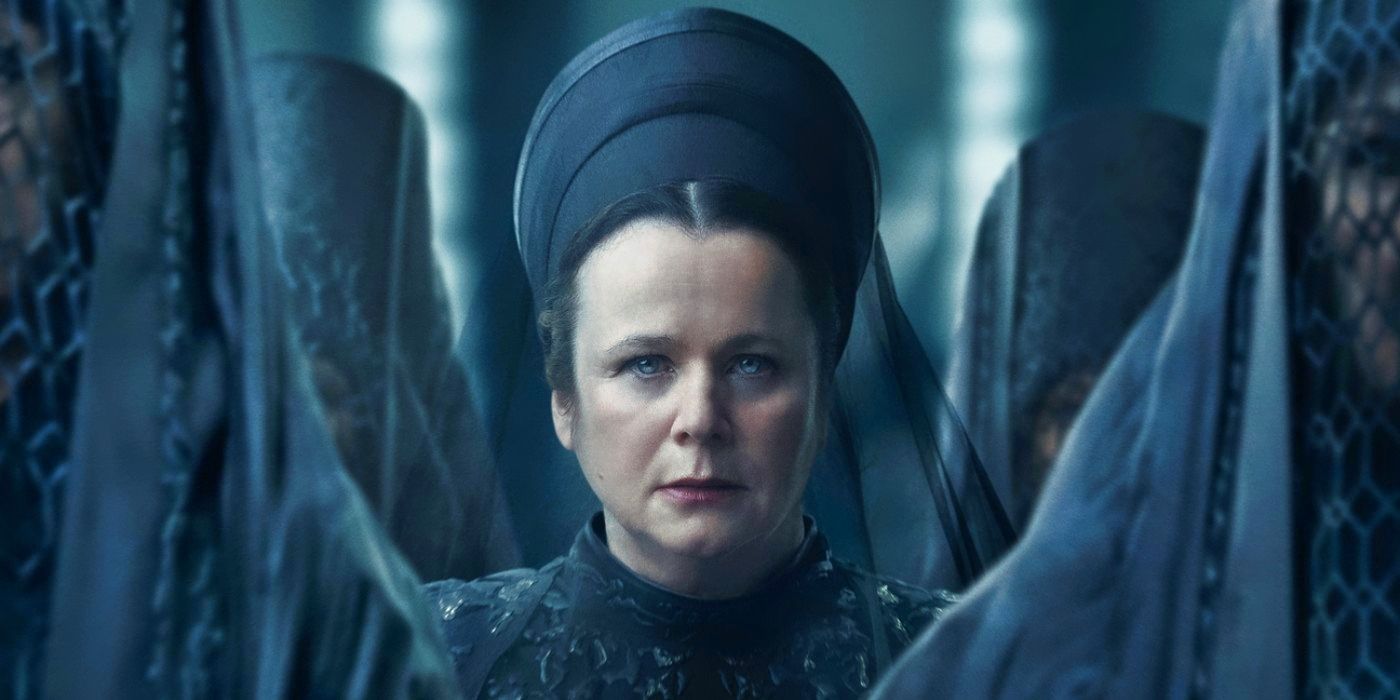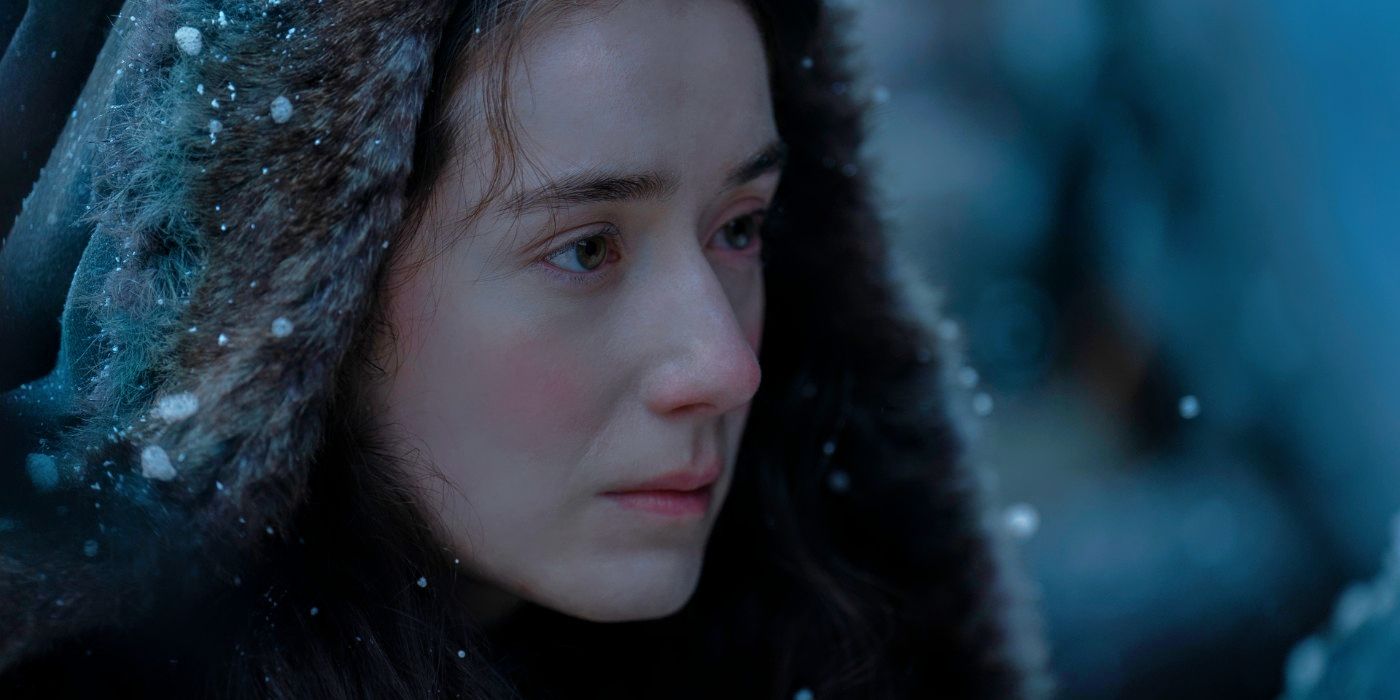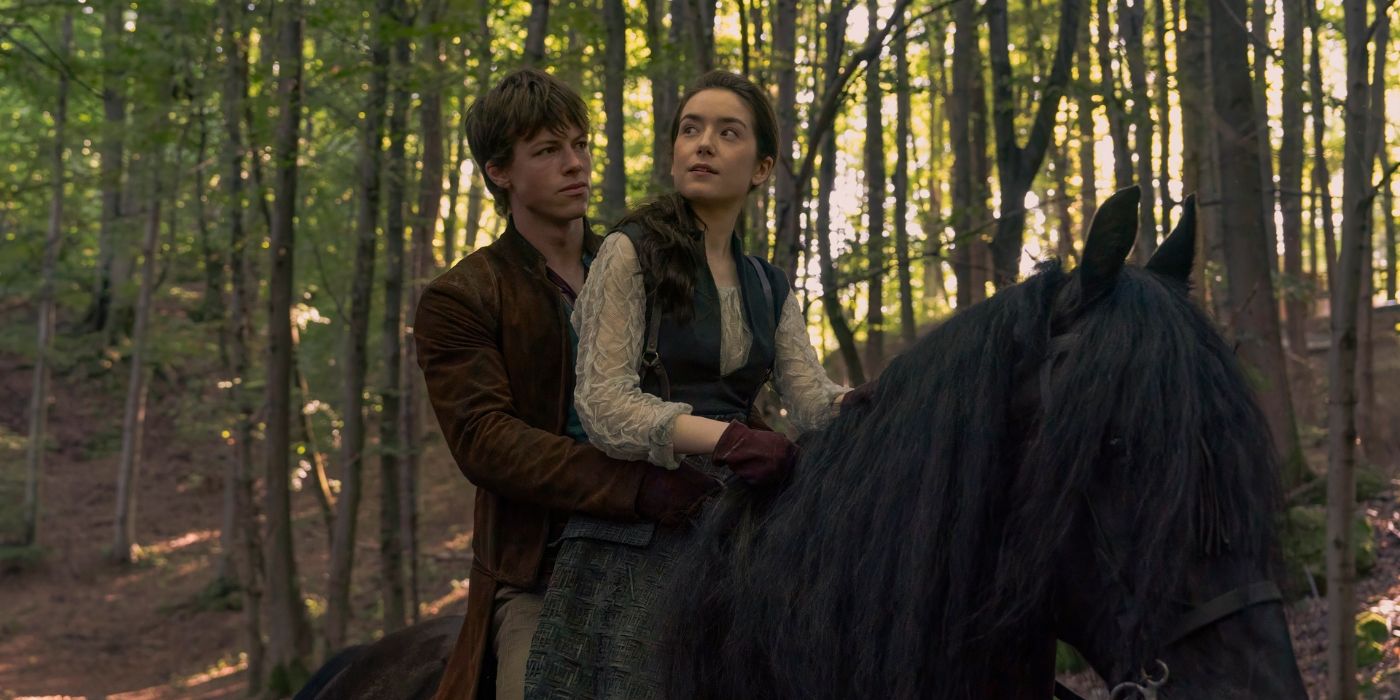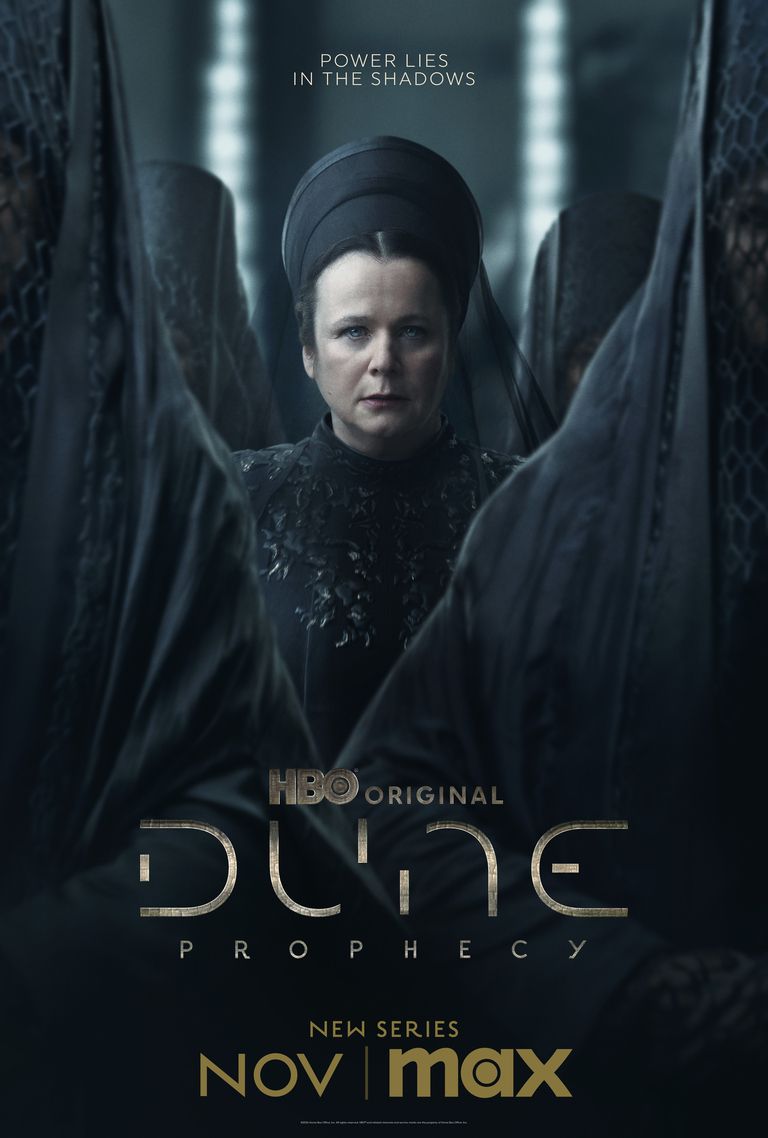Editor’s note: The below interview contains spoilers for Dune: Prophecy Episode 3.Although HBO’s Dune: Prophecy takes place 10,000 years before the birth of Paul Atreides (Timothée Chalamet), many of the familiar touchstones fans have come to recognize from Denis Villeneuve‘s big-screen adaptations of Frank Herbert‘s universe are still alive and well. The planet of Arrakis is becoming a battleground for control over spice. The mysterious and powerful Sisterhood is asserting itself as an influential force in politics and society alike, and evolving into the sect that will eventually be known as the Bene Gesserit. However, the Imperium’s biggest feud between the houses of Atreides and Harkonnen is still alive and well, as this week’s episode reveals.
We’ve been afforded flashbacks into the lives of the younger Valya Harkonnen (Jessica Barden) and her sister Tula (Emma Canning) before, but “Sisterhood Above All” turns out to have a double meaning. The past unveils not only Valya’s journey to becoming a Reverend Mother through the Agony ritual, but just how far Tula is willing to go to exact revenge on her sister’s behalf. Ahead of the episode’s premiere, Collider had the opportunity to speak with Canning about being cast as the younger version of Tula Harkonnen and the “grotesque” mission her character carries out against House Atreides to avenge her brother, Griffin. Over the course of the interview, which you can read below, Canning discusses her process in preparing to play a younger version of Olivia Williams, how those scenes set in the present helped her define the character, why Tula’s relationship with the ill-fated Orry Atreides (Milo Callaghan) was always meant to be a real love story, and more.
COLLIDER: How did you first hear about this project and this role?
EMMA CANNING: I taped for the early version of the show, and as most tapes go, it passes you by, and then you don’t really think about it again if whatever they’re doing is going well. That was summer, and then the next summer, I auditioned. I got a tape through for Dune: Prophecy, and it was to play Young Tula. Casting did say that it was to play young Olivia Williams. Before I put a tape down, I wanted to listen to some of her interviews, but in searching, I then saw a young headshot of her, and I was like, “Oh!” The audition process, because it’s so top secret and confidential, the scenes you got are dummy sides, basically, so I didn’t really know anything.
I did a really wonderful Zoom audition with Anna [Foerster], our first director. She had me doing crazy things. “Before the scene, I want you to scream with as much rage as you’ve ever felt.” It was very freeing, just seeing, “Can they push me in this direction?” Because the stakes of the story are so extreme that you really need to be sure about the actors you’re working with in terms of reaching over those heights, for want of a better word. Then I was offered the role, and then I found out. Alison [Schapker], our producer, called, and was really generous with her time and talked me through the whole arc of the show and then, within it, Tula’s arc, which was all news to me. So, I came off that Zoom call pretty rattled, honestly.
Emma Canning Explains Why It Was More Freeing to Play the Younger Tula
Was it more intimidating to play a younger version of a character that someone else is playing, or was there more freedom involved because you’re helping define who this character is early on?
CANNING: I would agree there was a freedom, because there is that 30-year gap, and I felt Olivia had the more difficult job because she had to interpret and modify it for herself and for the character, how the events that I just get to kind of play and exist within then are metabolized after the aftershocks of that and what those things would do to a person. So, there’s kind of a depth to the work she had to do, which I think is more challenging. She was incredibly generous with how she spoke about Tula with me, but also, I didn’t feel surveilled. She really trusted that I could carry that part of the story.
I actually found it very useful to have her as a… I keep using the word shape. I’m Irish, so I’m not working in my natural accent, and Olivia was, so it gave me an actual, specific voice to do. Also, through watching dailies, just from observing the work she was doing, she gave me a tone, and she gave me a shape to see how I fit within that just by being a different person and being a different age that’s going to look slightly different.

Related
When Does ‘Dune: Prophecy’ Take Place in the Overall Timeline?
‘Dune: Prophecy’ shapes one of the Dune universe’s biggest conflicts.
In this episode, we flash back to this really pivotal event that happens to the Harkonnens and how that inspires Valya to make a really decisive move. She’s a character who, from the beginning, is driven by ambition. She wants to restore her house. She’s warning everyone against complacency. With Tula, by comparison, we don’t know what’s going on in her head in those early scenes. What did you latch onto for her as a driving force, or do you think she doesn’t really know what her drive is at that point?
CANNING: This is actually where I find having the flash-forward scenes very useful, because I got to hear those tiny snippets of how Valya and Tula talk about themselves as younger women. There’s that wonderful scene in Episode 2 where they talk about each acolyte. They’re talking about Lila, and Valya calls her a little lamb lost in the woods, and Tula says, “Not too dissimilar to me at that age.” I latched onto that image and that perception. What was that to actually occupy, to then have Tula think back on and really relate to that image of herself? Then I used the other idiom of a wolf in sheep’s clothing. It was really useful to play with in my mind. “When am I a little lamb, and when am I actually a wolf in sheep’s clothing?” And I could switch line by line and in scenes.
There’s a line that you have in this episode that didn’t stick out to me until I rewatched it, knowing what happens at the end. You say that true strength can’t always be viewed from the outside, and that’s such a great summation of who Tula is in this episode. We underestimate her, other characters underestimate her, to your point, based on how she presents herself. While she’s not as outwardly assertive as her sister is, or maybe as outwardly confident, she’s still a threat, and she still has skills that she can wield.
CANNING: That is a major skill of hers, to let other people make waves and just ride those quietly. If you think of geese flying, she’s using the slipstream. She’s not taking the brunt. I think it’s very clever and a very energy-efficient kind of training. She doesn’t need to be looked at. A lot of people, they want to be seen, and they want to be heard. [Tula] has, by circumstance, been molded in a way that she’s not had that, so she’s learned how to survive without that, and also to survive within that.
Emma Canning Discusses ‘Dune: Prophecy’s Star-Crossed Love Story
I would love to know your reaction to reading the massacre scene because, as viewers, we’re lulled into a sense of thinking that this is a Tula who has left her family and is trying to start over. As we soon find out, that’s not the case. She’s really been tapped to be on this revenge mission for her family, for her sister.
CANNING: I was told the arc of this story by Alison before. She wanted to not only give me a heads-up, but really flesh out and almost tell me the story from Tula’s point of view, so I would reach that point and already know that I was on a mission. As a viewer, you’re all of a sudden dropped in there. I never had the experience of it being a shock or having to do the double take or the turnaround.
Something that I found interesting about reading the script as a whole is that there are a lot of huge events and actions in the script, stabbing included, and when you read those, you’re reading dialogue, and, especially as an actor, that’s really what you’re holding on to and the stuff you have to learn, but also the stuff to dissect and understand. Often, you can just kind of pass those stage directions by because sometimes they’re not that useful. It might be too illustrative, but there are a lot of stage directions like “Tula stabs Orry” or “All of the Atreides lie dead on the ground,” that, upon reading, you kind of brush through. Then, upon playing, you realize they’re scenes in themselves and major events in themselves, and that was a huge shock, living those.
Tula’s reaction to injecting Orry is interesting. When you find out that this was her mission, you might expect that, in the moment, she’s more cold or removed, but she’s crying over him. I wanted to ask about playing the really complex emotions of that scene, because it does feel like she had a degree of feeling, even knowing what she had to carry out. How did you want to balance that necessity of carrying out what she knew she needed to do versus this maybe being someone that she really did have feelings for in the end?
CANNING: In prep, Richard Lewis, our amazing director of Episode 3, and Alison talked about this dynamic, and they gave me such a gift in their certainty that this was a love story and that it had to be a love story. They wanted this to rival Romeo and Juliet — two warring families, and this is a love that shouldn’t happen and that cannot be. There is another option where she doesn’t get attached to Orry, and this is all calculated, and I think, ideally, that’s what [Tula] wanted it to be, but this is a huge lesson in the complexity of humanity and being surprised by people. Orry and the Atreides keep surprising Tula in ways that I think we all understand as we grow up, having prejudice or preconceptions, and without coming face to face with them, there’s no way to question that.
She goes off on this mission with the plan to target Orry. That’s what she and Valya have agreed — an eye for an eye. Griffin was our brightest light, Orry is the Atreides’ brightest light. She finds this independence and courage, and this plan morphs into something much more grotesque. It becomes a massacre. It just all grows legs, and she can’t control how she feels. She doesn’t have any sounding board. The inner turmoil is immense. So, those tears, there was so much wrapped up in that.
The last scene between Tula and Valya, where Valya undergoes the Agony and then Tula makes the decision to join her sister in the Sisterhood — part of it feels like she’s committing herself more to her sister over being a Harkonnen. How does that change her moving forward and ultimately determine where she ends up?
CANNING: That decision is so spurred on by heartbreak, but also utter self-loathing. Valya is the only one, including Tula, who sees this as a noble thing that she did. I don’t think Tula sees it that way. I think she has a lot of deep regrets about it. So, the fact that Valya is offering this positive impression of herself is sort of a lifeline. Her family, which we see in this episode after the massacre, are kind of like, “What has she done? You were the sweet child. This is awful.” So, she can’t escape it at home, she can’t escape it by herself. It’s all she can think of.
Then Valya comes home and through just being with Valya, Tula finds an escape and takes that to the next degree and actually wants a physical escape. “Yes. Let’s leave. I never want to think about this place or these events or these people, my family, who I thought I was doing this for. I want to leave that self behind. I want a clean break.” She’s worked so hard to gain Valya’s approval, and that’s kind of all she’s left with. She can’t let Valya leave, or she has to leave with her.
New episodes of Dune: Prophecy premiere every Sunday on Max.
Watch on Max



